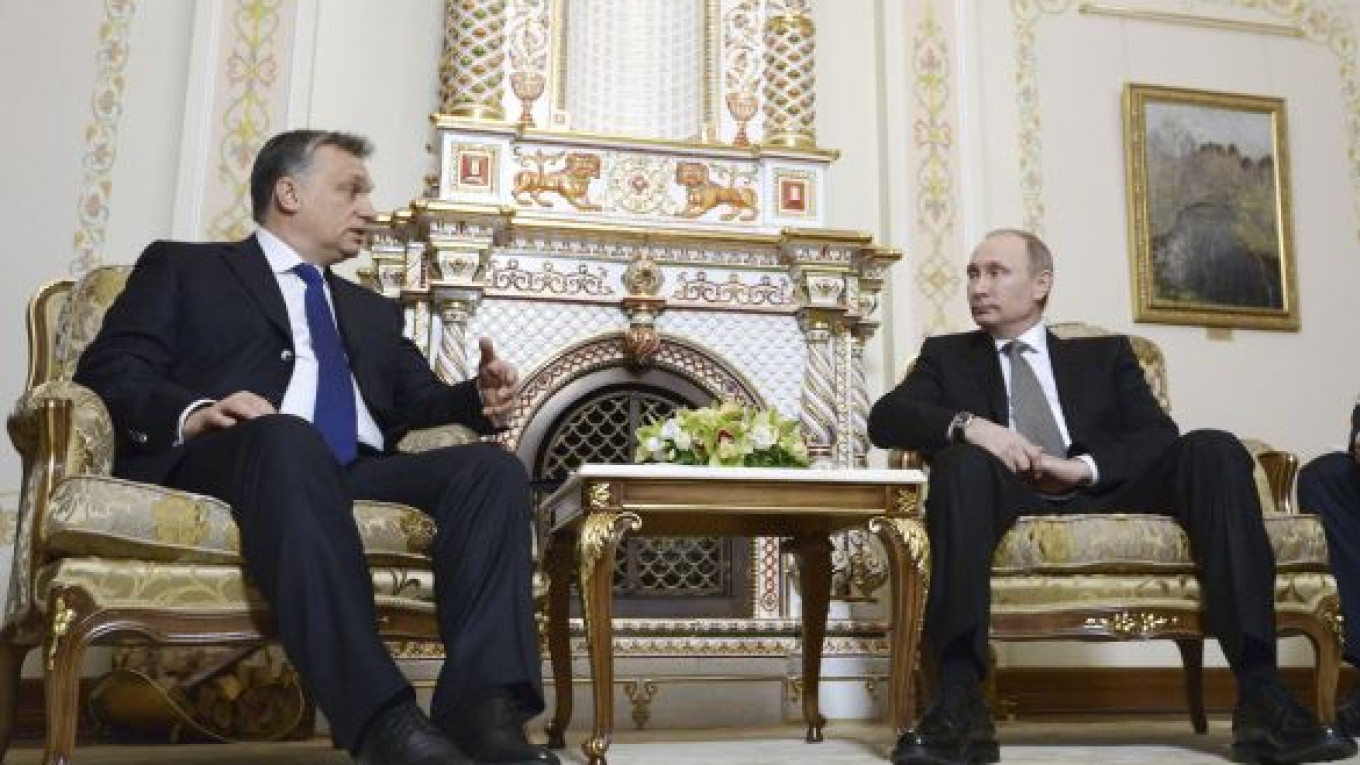As Russia looks for more profits from long-term nuclear energy projects with other countries, President Vladimir Putin and visiting Hungarian Prime Minister Viktor Orban on Tuesday agreed a deal to finance the construction of two new blocks at Hungary's Paks nuclear power plant.
Russia will lend up to 10 billion euros ($13.7 billion) to Hungary to help build the power-generating units, Sergei Kiriyenko, head of state-owned nuclear plant builder Rosatom said, RIA Novosti reported. The units will double the power plant's current two gigawatt capacity.
Russia expects to gain high returns from supplying the power units, which will be produced at home, as well as from future fuel supply and disposal contracts.
The Soviet-built Paks nuclear plant, located south of Budapest, produces 40 percent of Hungary's electricity at what is said to be the cheapest cost relative to other means of production.
Talks on boosting the plant's capacity have been ongoing since 2009, when a Hungarian parliamentary resolution to start preparation works on the project was first disclosed to public.
Local ecologists, however, have questioned the necessity to increase the power plant's production capacity and expressed concern over the lack of accessible information on the subject. They have also questioned why there have been no international tenders held prior to negotiations with Rosatom.
"Building a nuclear power plant is not a technical question. It cannot be put into the hands of engineers or politicians only, it should be a real public issue," said Andras Perger of the Hungarian Institute of International Affairs, a local energy sector think tank, at a conference dedicated to possible Paks expansion last year.
At the same conference, Hungarian energy specialists stressed that "Russians are much more experienced in positioning nuclear projects than Hungarians are in implementing them," possibly referring to an accident that occurred at Paks in 2003, when some fuel elements broke during cleaning procedures resulting in leakage of spent fuel. It took 18 months to restore the unit to operation.
The damaged fuel elements are to be shipped back to Russia, which supplied them in the first place. This is common practice under similar foreign radioactive fuel supply contracts Russia has with other countries. According to the Hungarian Atomic Energy Authority, the start of shipments is expected in 2014.
That Russia agrees to have the used fuel shipped back to the country from Rosatom-built power plants may be the reason why the state-owned company was so successful in acquiring foreign contracts, Russian ecologists said.
"International construction [of nuclear power plants] under the Build–Own–Operate or Build–Own–Operate–Transfer contracts means that Russia undertakes to ship the used fuel back onto its territory. Ecologists are combatting this practice, calling it ecological underbidding," wrote Alexander Nikitin, head of Russian-based ecology protection group Bellona, summing up developments in the nuclear sector in 2013 on the organization's website.
Drawing his own line under Rosatom's achievements last year, Kiriyenko told President Putin earlier in January that the company has 20 ongoing foreign contracts to build and supply nuclear power blocks. Since the accident in Fukushima in 2011, the amount of Rosatom's contracts oversees grew twofold. Forty more agreements are in the works.
The latest, signed in December 2013, was a deal with Finnish nuclear consortium Fennovoima to both invest in and build its 1,200 megawatt reactor, due to begin operations in northern Finland in 2024. The cost of the project is estimated at more than $8 billion.
Russia will provide and dispose of the fuel for the plant, which is expected to run for 80 years.
The disposal of spent fuel will mean revenues more than twice the cost of building the plant, Kiriyenko said. More profits for that project are also expected to come from servicing the plant, he added.
Contact the author at a.panin@imedia.ru
A Message from The Moscow Times:
Dear readers,
We are facing unprecedented challenges. Russia's Prosecutor General's Office has designated The Moscow Times as an "undesirable" organization, criminalizing our work and putting our staff at risk of prosecution. This follows our earlier unjust labeling as a "foreign agent."
These actions are direct attempts to silence independent journalism in Russia. The authorities claim our work "discredits the decisions of the Russian leadership." We see things differently: we strive to provide accurate, unbiased reporting on Russia.
We, the journalists of The Moscow Times, refuse to be silenced. But to continue our work, we need your help.
Your support, no matter how small, makes a world of difference. If you can, please support us monthly starting from just $2. It's quick to set up, and every contribution makes a significant impact.
By supporting The Moscow Times, you're defending open, independent journalism in the face of repression. Thank you for standing with us.
Remind me later.






